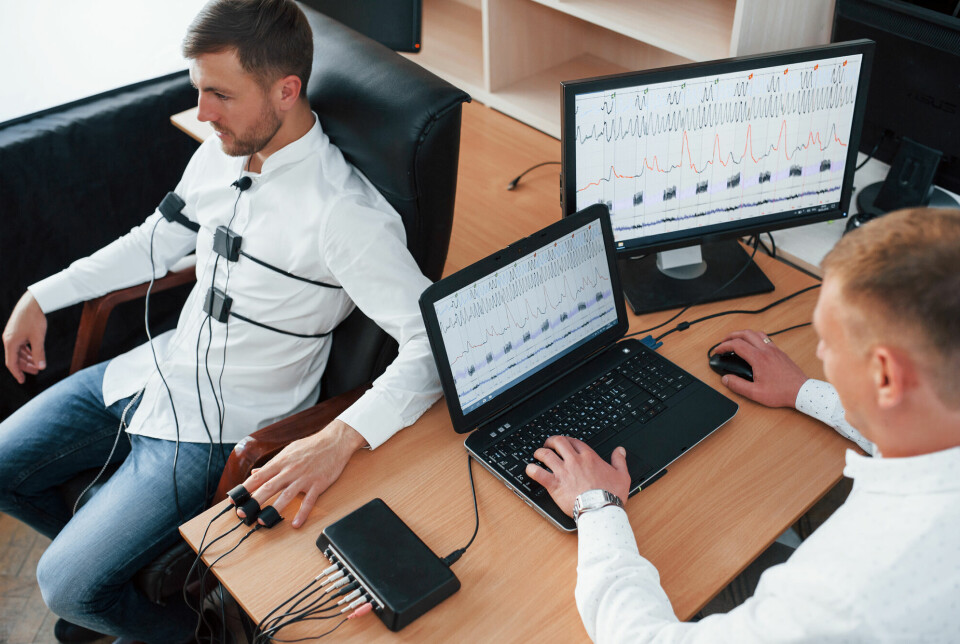
How can you tell if someone is lying?
ASK A RESEARCHER: It is not true that those who lie are nervous. So how can we catch someone in a lie?
Many of us lie. Some lie every day, and some never lie.
75 per cent of people tell zero to two lies every day. Only 1 per cent almost never lied, according to Science Illustrated (link in Norwegian).
But can we tell if someone is lying?
You might assume that a person who is lying would appear nervous and uncertain, but that's not actually the case.
“For example, if you're sitting on the bus and there's a ticket inspection, you get nervous even if you have a ticket,” Tim Brennen tells sciencenorway.no.

Tim John Brennen is a professor at the University of Oslo and researches forensic psychology. This includes, among other things, memory, facial recognition, and how we can see through lies.
Do not want to seem nervous
Because people are so anxious about being caught in a lie, they often focus on not appearing nervous.
“Most people think they have more of these nervous movements when they lie. But it turns out that the number of nervous movements actually decreases,” Samantha Mann said in a 2014 article on forskning.no (link in Norwegian).
There are several reasons for this.
Since lying requires a lot of mental effort, we expend less energy on our body language.
Even if you feel nervous while lying, it will not be evident in your body language.
“People actually tend to sit more still when they lie, but that’s also not a reliable indicator,” Mann said.
Listen to the language used
“In a legal context, it’s absolutely not sufficient. Even when telling the truth, there are valid reasons to feel nervous,” Brennen says.
He says that most of us are aware that we should not appear nervous when lying, and some even try to exude great self-confidence when telling a lie.
“Research shows that there are no reliable physical signs of lying. But some analyses show that you can look at the language used and what is being said,” Brennen says.
But this does not work 100 per cent of the time and is not precise enough in a court case.
“There are different things we look for in the language used. We look at the content. For example, if a person doesn’t remember everything or if the story is too simple. Real life is often more complicated,” he says. “Large studies have been conducted that show some common traits among those who lie, but this doesn’t apply to every individual.”
You may have seen YouTube videos where someone takes a lie detector test. The actual name for this device is a polygraph.

Most viewed
It measures various factors including breathing, pulse, sweat, and how stressed you become.
“The polygraph has a certain level of effectiveness, around 70 per cent. However, you can’t use something in court that is only reliable 7 out of 10 times,” Brennan says. “You also can’t say: ‘I know they’re lying because they’re sitting still’. There is simply not enough evidence.”

The brain works hard
Since the brain works so hard when we lie, it’s something you can use if you're trying to catch someone in a lie.
“When you lie, you have to think about what the other person already knows, how to stick to the lie and avoid revealing some of the truth. You also need to be vigilant about whether they believe the lie or not. This means that our brains are working at full capacity,” Mann explains.
Brennen and his colleague Svein Magnussen state in an article on Psyche that no one is more skilled than others at guessing if someone is lying, not even professionals like police officers, judges, and psychiatrists.
“How can we reveal if someone is lying?”
“The key is to use common sense. So you can ask the person to explain, without giving them the information you have,” Brennan says. “We have no magical methods for revealing lies. The key is to think rationally and not believe all claims that tell us how we can expose liars.”
———
Translated by Alette Bjordal Gjellesvik.
Read the Norwegian version of this article on ung.forskning.no




































